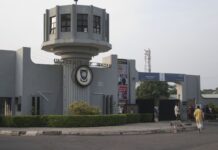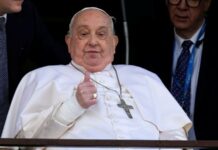Yinka Odumakin
The Nigeria Broadcast Commission is currently tongue-tied over a letter written by the Sharia Board in Kano (Hisbah) to Cool FM Radio to stop using the term “Black Friday” in Kano State.
In the rest of Nigeria only the NBC has the right to regulate activities of broadcast organisations until the dual ideology in Nigeria brought up Shari’a rule in violation of the joke in the 1999 Constitution that any law that is inconsistent with provisions of the grundnorm shall be null and void.
The NBC Act states that the commission is the only organisation that has the powers to prescribe a code for broadcasters and sanction them. Last Thursday, the Kano State Hisbah Board, which is tasked with the duty of enforcing Sharia law in the state, wrote a letter of warning to a radio station in Kano State, 96.9 Cool FM, for using the term ‘Black Friday’.
Black Friday is an informal name for the Friday following Thanksgiving Day in the United States, and is celebrated on the fourth Thursday of November. The term is used worldwide to mean a day for promotional sales where goods are sold at discounted prices.
However, a letter signed by Principal Executive Officer II, Abubakar Ali, on behalf of the Commander-General, Hisbah stated that Friday is regarded as a holy day in Islam and tagging it as ‘black’ is derogatory and would not be condoned.
Black Friday
The Hisbah guys must probably not have a black skin to stigmatise black this way. The letter titled: ‘Letter of Introduction’ reads in part: “I am directed to write and notify you that the office is in receipt of a complaint for the conduct of ‘Black Friday Sales’ on November 27, 2020. Accordingly, we wish to express our concern on the tagging of Friday as ‘Black Friday’ and further inform you that the majority of the inhabitants of Kano State are Muslims that consider Friday as a holy day.
“In view of the foregoing, you are requested to stop calling the day ‘Black Friday’ with immediate effect and note that the Hisbah Corps will be around for surveillance purposes with a view to avoiding the occurrence of any immoral activities as well as maintaining peace, harmony, and stability in the state.”
This country has witnessed raw deals that Hisbah is capable of meting in violent violation of the Constitution and the further enforcement of anarchy the zealots are capable of rolling out as outlaws. Nigerians would not forget in a hurry the 2006 sectarian violence over a cartoon in Denmark. The violence erupted as the Danish cartoonist whose drawings originally sparked the furore, Kurt Westergaard, used an interview with a British newspaper to defend the right to a free press which it said the Islamic faith had violated.
Several years after the controversy began, after-effects are still felt around the world. The first protests in Nigeria flared in Borno and Katsina: witnesses said hotels and shops were torched by protesters who ran wild after police fired teargas to disperse them. The cartoonist at the heart of the row, who had gone into hiding after a bounty was put on his head and conducted the interview with the Glasgow Herald newspaper via written questions, said he had not expected such controversy but did not regret the drawings.
He defended it as ‘a protest against the fact that we perhaps are going to have double standards [in Denmark and Western Europe] for freedom of expression and freedom of the press’.
The Nigerian riots were the first protests in Africa’s most populous country, which is divided equally between Christians and Muslims. The worst of the trouble, involving 15 deaths, was in the North Eastern state of Borno – a predominantly Muslim state with a sizeable Christian population. Troops were deployed in the state capital to restore order.
There was 2002 before 2006 when Isioma Nkemdilim Nkiruka Daniel (a Nigerian journalist with Thisday whose newspaper article comment involving the Islamic prophet Muhammad sparked the Miss World riots and caused a fatwa to be issued on her life. She ultimately had to flee the country because of Jihadists. Only God knows her state of being now. The government of Zamfara State had called on Muslims to kill journalist Isioma Daniel over an article she wrote about the Miss World pageant, which was to have taken place in Nigeria. Rioting that killed more than 200 people in the wake of the article prompted the organisers of the pageant to move the event from Nigeria to London.
Ms Daniel apologised for the article. The office of her newspaper, This Day, was levelled by angry Muslims during the riots in Kaduna. A fatwa (death sentence) was placed on the young lady by Zamfara government. Nigerians are not likely to forget easily the killing of 16 people and the burning of churches in Borno and Katsina as part of the Islamic world rage over a Danish newspaper cartoon in 2006 which was considered offensive to Islam.
Different strokes for different folks, they say. When Mallam Nasir El-Rufai during his war of attrition with the Dr. Goodluck Jonathan government in 2012 used Jesus as a toothpick on his notorious Twitter, he did not come under any harm nor was he sentenced to death outside verbal rebuke by the Christian Association of Nigeria, CAN.
The then Secretary of the body, Rev. Musa Asake, said that in spite of warnings for Mr. El-Rufai to stop such provocative and disrespectful comments that carry chains of implications, the latter had gone ahead to post a response considered insulting to the Christian faith on Twitter when he re-tweeted an analogy that appeared offensive to Jesus Christ.
The former minister who is now a governor said it was intended to be a criticism of Facebook page apologising to those that saw the tweet as offensive. His explanation was that he did not mean the statement to come across as an insult to the Christian faith. “I must say I am taken aback by the extent of desperate misrepresentation of what was an innocuous attempt to show the godlessness of the Jonathanians to denigrate anyone that dares to ask them to be accountable,” Mr. El-Rufai had said in his reaction.
But the CAN scribe said there was a portion of the response that insulted the Christian faith, pointing out that the association is convinced Mr. El-Rufai is set on a war path with Christians in Nigeria. Asake wrote: “We must state that unlike others, Christians do not shed blood, take life, kill or maim others at the slightest provocation.
Nevertheless, we must warn El-Rufai not to take Christians for granted and to inform him that it is with great difficulty that we have had to restrain our youths from taking the law into their hands; which by extension means bringing El-Rufai to justice on account of his incitement and insult against the Christian faith.”
The scenarios depicted above form the major problem with Nigeria which it is running from instead of addressing and for which it may end up in the ditch if it does not turn back from the senseless trip. This was the conversation between Francis Fukuyama and his former teacher, Samuel Huntington.
At the end of the cold war, Fukuyama wrote The end of history and the last man where he painted a glossy illusion of the new world order, but his former teacher, Huntington, wrote The clash of civilisations which predicted that the new world would be governed by clashes along cultural and religious lines as it is the era of self-determination.
The teacher has been proved right as the word “genocide” has been heard more around the world in the new order than all the years of cold war. Nigeria can’t continue to deceive itself about “indivisibility” and other jejunity while plunging itself deeper and deeper into the abyss. We wait to see the country it would emulate if it survives these unitary contradictions unaddressed.
Nov 27 that wasn’t in Osun
Tension built up recently in Osun ahead of the November 27 grand finale of the second anniversary of the Osun State Governor, Mr. Gboyega Oyetola, as the Minister of Interior and former Governor of the state, Ogbeni Rauf Aregbesola was said to be coming the same day to celebrate 10 years of progressive governance in the state as if the history of the state started with when he became governor.
I was in secondary school when Chief Bola Ige governed Oyo which Osun was part of and we saw the implementation of the cardinal programmes of the Unity Party of Nigeria, UPN.
I was the secretary of the Afenifere visitation panel to Osun State in 2001 headed by Chief C .O. Adebayo and we scored Chief Bisi Akande high in progressive governance within limited resources. Those years don’t make the so-called progressive years.
When opposition to the not-well- thought-out programme mounted, the media aide to the minister told an untruth that the programme was in fulfillment of presidential directive that ministers should go and interact with their constituencies. Did he ask them to go and cause worse situation than EndSARS in their states?
Another aide of the minister caused so much hysteria, sounding war drums of their readiness to crush any opposition to the event. It was my friend, Tony Iyare, who once wrote that if a Lawrence Anini was given the privilege of writing his epitath it would read like: “Here lies Chief Anini, a great and accomplished businessman.”
We cannot forget in a hurry what happened in those eight years of Ogbeni. I remember this classmate of mine in secondary school who is an official in the state service I ran into about four years ago. As he stopped and greeted, I bent to greet him as he looked so old until he mentioned his name. His ears were the hangers that did not allow his cap to fall off. I asked him what was amiss and he told me he had not received 11 months salaries!
While the sabre-rattling lasted, the former governor of the state, Prince Olagunsoye Oyinlola, made the intervention of a statesman. “It is common knowledge that Mr. Aregbesola took over from me, and despite the circumstances of his coming to that office, I did not do anything to undermine his authority throughout his eight years in government.
That is the spirit with which I appeal that the Interior Minister (Aregbesola) avoid doing anything that will suggest a plan to make the state ungovernable for Mr. Oyetola.
“As a former governor of that state, I plead that we give peace a chance. The state has witnessed enough unnecessary crises in recent weeks coupled with the coronavirus pandemic which has affected people’s economy and general wellbeing. Our people are suffering; they deserve a respite from all forms of crises as they struggle to make ends meet.
“As leaders of our people, we all have a stake in making Osun State to work for the good of our people who have had to deal with one hardship or the other. We will be seen as doing that when we avoid making the job of the incumbent governor difficult for him. May God help our state and its people in this difficult time.”
That is a mature mind at work and it is good wise counsel prevailed and Osun was not thrown into unnecessary crisis through internal punches.



























































